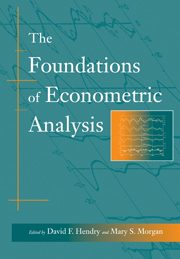Book contents
- Frontmatter
- Contents
- Preface
- Acknowledgements
- Introduction
- Bibliography
- I The Emerging Role of Econometrics in Economics
- II Early Time-Series Analysis
- III Applied Econometrics and the Identification Problem
- IV The Evolution of Statistical Thinking in Econometrics
- V Dynamic Models
- VI The Tinbergen Debate
- VII Structure and Simultaneity
- VIII The Probabilistic Revolution
- 42 The Probability Approach in Econometrics (Supplement to Econometrica, vol. 12, 1944, pp. iii–iv, 1–11, 49–52, 114–15)
- 43 ‘Measurement without Theory’ Debate (Review of Economics and Statistics, vol. 29, 1947, pp. 161–72 (cut); vol. 31, 1949, pp. 77–93 (cut); and Journal of the American Statistical Association, vol. 46, 1951, pp. 388–90)
- IX Exogeneity
- Index
43 - ‘Measurement without Theory’ Debate (Review of Economics and Statistics, vol. 29, 1947, pp. 161–72 (cut); vol. 31, 1949, pp. 77–93 (cut); and Journal of the American Statistical Association, vol. 46, 1951, pp. 388–90)
Published online by Cambridge University Press: 05 June 2012
- Frontmatter
- Contents
- Preface
- Acknowledgements
- Introduction
- Bibliography
- I The Emerging Role of Econometrics in Economics
- II Early Time-Series Analysis
- III Applied Econometrics and the Identification Problem
- IV The Evolution of Statistical Thinking in Econometrics
- V Dynamic Models
- VI The Tinbergen Debate
- VII Structure and Simultaneity
- VIII The Probabilistic Revolution
- 42 The Probability Approach in Econometrics (Supplement to Econometrica, vol. 12, 1944, pp. iii–iv, 1–11, 49–52, 114–15)
- 43 ‘Measurement without Theory’ Debate (Review of Economics and Statistics, vol. 29, 1947, pp. 161–72 (cut); vol. 31, 1949, pp. 77–93 (cut); and Journal of the American Statistical Association, vol. 46, 1951, pp. 388–90)
- IX Exogeneity
- Index
Summary
The Empirical Approach
When Tycho Brahé and Johannes Kepler engaged in the systematic labour of measuring the positions of the planets, and charting their orbits, they started with conceptions and models of the planetary system which later proved incorrect in some aspects, irrelevant in others. Tycho always, and Kepler initially, believed in uniform circular motion as the natural basic principle underlying the course of celestial bodies. Tycho's main contribution was a systematic accumulation of careful measurements. Kepler's outstanding success was due to a willingness to strike out for new models and hypotheses if such were needed to account for the observations obtained. He was able to find simple empirical ‘laws’ which were in accord with past observations and permitted the prediction of future observations. This achievement was a triumph for the approach in which large scale gathering, sifting, and scrutinizing of facts precedes, or proceeds independently of, the formulation of theories and their testing by further facts.
The book by Burns and Mitchell, discussed here, approaches the problems of cyclical fluctuations in economic variables in the same empirical spirit. The book has two main purposes: first, a detailed exposition, with experimental applications, of the methods of measuring cyclical behaviour, developed by the National Bureau of Economic Research; secondly, a search, with the help of these methods, for possible changes in cyclical behaviour of economic variables over time, whether gradual, abrupt, in longer cycles, or otherwise.
- Type
- Chapter
- Information
- The Foundations of Econometric Analysis , pp. 491 - 524Publisher: Cambridge University PressPrint publication year: 1995



